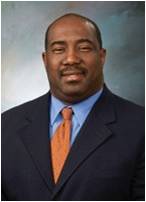 |
Willie Underwood, III M.D., M.P.H., M.Sci. Clinical Associate Professor of Urology School of Medicine and Biomedical Sciences, State University of New York at Buffalo Associate Professor, Department of Urology Office of Cancer Health Disparities Research Roswell Park Cancer Institute Elm and Carlton Streets Buffalo, NY 14263 phone: 716-845-3389 email: willie.underwood@roswellpark.org |
Willie Underwood, III M.D., M.P.H., M.Sci., is passionate about reducing prostate cancer disparities. For the past decade, Underwood, who is currently Associate Professor, Department of Urologic Oncology at Roswell Park Cancer Institute (RPCI) in Buffalo, NY, has been committed to improving our understanding of the patterns and causes of racial and socioeconomic differences in prostate cancer early detection, treatment, and survival.
Prostate cancer is the most common cancer in men. It also is a cancer associated with racial disparities. Among black men, the incidence of prostate cancer is approximately 1.6 times greater than for white men. Black men are also more likely to be diagnosed at a younger age and with higher-grade cancers. And once diagnosed, black men are more than twice as likely to die from prostate cancer as white men.
In 2009, Underwood, who conducts the research arm of his practice at RPCI's Office of Cancer Health Disparities Research, uncovered some interesting findings about the role of attitudes and beliefs in cancer. His study demonstrated that, while black men had a higher than average risk for prostate cancer, they actually believed their prostate cancer risk to be lower than average. In contrast, white men reported a higher than average perceived risk of prostate cancer.
In a second study, Underwood's research showed that the racial difference in perceived cancer risk extended beyond prostate cancer to cancer, in general. This is an important finding, since men's perceptions of their own cancer risk has a profound effect on their preventive behavior, treatment outcomes, and survival. Underwood explains, "This research underscores the need to improve our understanding of the factors that influence prostate cancer treatment decision-making, especially racial differences in treatment; we have not adequately communicated cancer risk in communities with a higher than average risk and may have overemphasized it in communities with a lower or average cancer risk."
Looking for reasons for the disparities in survival, Underwood discovered racial differences in prostate cancer treatment. Black men were less likely to receive definitive treatment (radical prostatectomy or radiation) than white men. In addition, when receiving non-definitive therapy (watchful waiting), black men were monitored less closely than white men and had a poorer prostate cancer-specific survival than white men. Moreover, the racial gap in receipt of definitive treatment increased with cancer severity. Among those diagnosed with moderate-grade prostate cancer, black men were about a third less likely than white men to receive definitive treatment. Among those with high-grade prostate cancer, black men were half as likely to receive definitive treatment as white men. "Those men at greatest risk of dying from prostate cancer were also exposed to the greatest disparities in care," Underwood said. "Regardless of race, equal treatment for equal disease resulted in equal survival outcomes."
In 2010, Underwood received two National Cancer Institute (NCI) grants to continue his line of research: an R01 grant for his study Race, Prostate Cancer Treatment, and Treatment Decision Difficulty and Regret; and a U54 CRCHD Community Networks Program cooperative grant for the Western New York Cancer Coalition Center to Reduce Disparities.
Underwood received his B.S. in Biology from Morehouse College in 1988. He subsequently received his M.Sci in Anatomy and Cellular Biology, and his M.D. from the Upstate Medical Center in Syracuse, NY in 1994. Following his residency in urology at the University of Connecticut Health Center in 2000, Underwood received training in health services research at the University of Michigan through the Robert Wood Johnson Clinical Scholar Program.
He joined the faculty of the University of Michigan's Department of Urology in July 2002 and worked there until 2005. During that time, he also pursued an M.P.H. from the University of Michigan School of Public Health. In 2005, he joined the urology department at Wayne State University and Karmanos Cancer Institute in Detroit, MI. He has held several policy positions in the American Urology Association (AUA) and the American Medical Association. He is also the recipient of the Robert Wood Johnson Foundation's Harold Amos Medical Faculty Development Award and the AUA Foundation/Astellas Rising Star in Urology Award.
